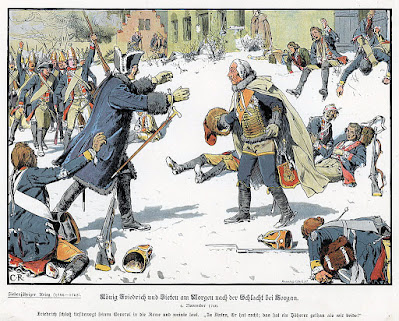
|
| Steuben Parade in New York in 1909 when the world was still in order (©Der Spiegel) |
A Prussian general better known here in Germany is Hans Joachim von Zieten, born in Wustrau in 1699. He was an intrepid cavalry general during the reign of Frederick the Great, commanding the red-uniform Hussar Regiment No. 2, the Zieten Hussars. He is also known as Zieten aus dem Busch (from the bush).

|
| ©Gleimhaus/Halberstadt Ulrich Schrader |
In Sinngedichte Johann Wilhelm Ludwig Gleims there is a French hating poem, "On the portrait of General von Zieten":
|
Das ist das ehrliche Gesichte, Das unsre Feinde zittern machte, Das Deutsche, welches uns den Sieg bey Torgau brachte, Für ein französisches lög' es der Teufel nicht. |
This is the honest face. That made our enemies tremble, The German that brought us the victory at Torgau, For a French one, the devil wouldn't lie. |

|
| The Prussian eagle above the entrance |
*Sponsored by the Ehrhardt Bödecker Foundation

|
| Zieten in bronze by Johann Gottfried Schadow in the park of the museum |
|
Der Zieten immer erster, wenn Preußen avancirt, Hingegen immer letzter, wenn Preußen retirirt. |
Zieten is always first when Prussia advances, But always last when Prussia retires. |
This was particularly true at the Battle of Torgau (November 3, 1760), the Seven Years War's last great and bloodiest battle. Once again, the Austrians outnumber the Prussians.
In his painting, Christian Bernhard Rode shows Frederick leaning against a tree at nightfall before the battle. Next to him sits his general of cavalry Hans Joachim von Zieten.

|
| ©James Steackley/Wikipedia |
Has the old general eaten from it? For when Frederick thought the battle lost, Zieten came with his cavalry from the bush, conquered the main Austrian battery, and had their cannons turned against them.
That brought the decision, but also the exhaustion on both sides, because the Prussians bought their victory with the loss of 16 750 men, while the Austrians lost only 15 200.
Theodor Fontane commemorated Hussar General Zieten in a ballad:
|
Dem Feind die Stirne bieten er tat’s wohl hundertmal. Sie haben’s all’ erfahren, wie er die Pelze wusch Mit seinen Leibhusaren, der „Zieten aus dem Busch“. Wie den Feind sie bläuten bei Hennersdorf und Prag, Bei Liegnitz und bei Leuthen und weiter Schlag auf Schlag; Bei Torgau, Tag der Ehre, ritt selbst der Fritz nach Haus, doch Zieten sprach: „Ich kehr' erst noch mein Schlachtfeld aus.“ |
He offered the enemy his forehead a hundred times. They have all experienced how he washed the furs, With his body hussars, the "Zieten from the bush." How they beat up the enemy at Hennersdorf and Prague, At Liegnitz and at Leuthen and further, blow after blow; At Torgau, the day of honor, even Fritz rode home, But Zieten said: "I'll sweep out my battlefield first." |

|
| Zieten sitting before his king. Etching by Daniel Chodowiecki (©Jens-Heiner Bauer/Wikipedia) |

|
| The Turkish saber dedicated by the king |
Potsdam, August 23, 1746.
After engaging in a reputed 74 duels and fighting four wars, Hans Joachim von Zieten died peacefully in his bed at 86.
After engaging in a reputed 74 duels and fighting four wars, Hans Joachim von Zieten died peacefully in his bed at 86.
*

No comments:
Post a Comment